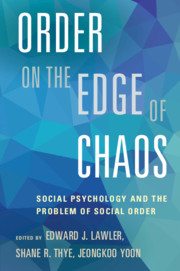Book contents
- Frontmatter
- Contents
- List of Contributors
- Preface
- 1 Social Psychology of Social Order: An Introduction
- 2 The Evolutionary Biology and Sociology of Social Order
- 3 Social Rationality and Weak Solidarity: A Coevolutionary Approach to Social Order
- 4 An Integrative Theory of Action: The Model of Frame Selection
- 5 The Center Cannot Hold: Networks, Echo Chambers, and Polarization
- 6 Social Exchange and Social Order: An Affect Theory Approach
- 7 Institutions, Trust, and Social Order
- 8 Identity Verifi cation and the Social Order
- 9 Identities, Roles, and Social Institutions: An Affect Control Account of Social Order
- 10 The Gender Frame and Social Order
- 11 Status, Power, and Social Order
- 12 Interaction Order: The Making of Social Facts
- 13 The Arts of Together: Social Coordination as Dyadic Achievement
- 14 Dignity as Moral Motivation: The Problem of Social Order Writ Small
- 15 The Legitimacy of Groups and the Mobilization of Resources
- Commentary: Contrasts and Complementarities
- Index
Preface
Published online by Cambridge University Press: 05 December 2015
- Frontmatter
- Contents
- List of Contributors
- Preface
- 1 Social Psychology of Social Order: An Introduction
- 2 The Evolutionary Biology and Sociology of Social Order
- 3 Social Rationality and Weak Solidarity: A Coevolutionary Approach to Social Order
- 4 An Integrative Theory of Action: The Model of Frame Selection
- 5 The Center Cannot Hold: Networks, Echo Chambers, and Polarization
- 6 Social Exchange and Social Order: An Affect Theory Approach
- 7 Institutions, Trust, and Social Order
- 8 Identity Verifi cation and the Social Order
- 9 Identities, Roles, and Social Institutions: An Affect Control Account of Social Order
- 10 The Gender Frame and Social Order
- 11 Status, Power, and Social Order
- 12 Interaction Order: The Making of Social Facts
- 13 The Arts of Together: Social Coordination as Dyadic Achievement
- 14 Dignity as Moral Motivation: The Problem of Social Order Writ Small
- 15 The Legitimacy of Groups and the Mobilization of Resources
- Commentary: Contrasts and Complementarities
- Index
Summary
The classic question posed by the philosopher Thomas Hobbes, “How is social order possible?,” is an enduring issue for the social sciences. Throughout the history of the social sciences, however, the prominence and salience of the issue waxes and wanes. A plausible hypothesis is that in times of great transformational change (e.g., the Industrial Revolution), the problem of social order tends to become front-and-center, whereas in times of great stability, it recedes into the background as social change takes precedence and becomes the dominant concern. This is a broad-sweeping and arguable hypothesis, but there are many reasons for viewing the early period of the twenty-first century as the dawn of another period of great transformational change, manifest, for example, in employment contracts, the technologies for communication, and global political and economic processes that blur nation-state boundaries. In this context, we address the larger problem of social order in a unique way, namely, by examining the micro-level foundations of social order.
By “micro-level” we mean social interactions and group processes within which people construct meanings, pursue individual goals, engage in group tasks, and generate collective goods available to them and perhaps a larger population. The social interactions are framed and shaped by macro structures and cultures, but it is in social interactions that larger structures and cultures are instantiated and essentially “come to life.” The central premise of this volume is that macro-level social orders, in the form of organizations, institutions, nations, and societies, are necessarily grounded in the interactions of people within those larger orders. Macro orders exist and endure only if individuals in interaction with others enact, produce, or reproduce them. Thus, it is important to delve more deeply into how micro processes generate, sustain, or reproduce patterns of behavioral regularity that constitute social order.
This volume brings together in one place the major theories in sociology that concern micro-level social interactions. The intellectual traditions represented here are sometimes termed “micro-sociology” and sometimes termed “sociological social psychology.” Whatever the value of these particular labels, the important point is that micro-sociologists have for many years developed theories of social interaction with implicit or explicit implications for social order. For this volume, we invited leading scholars from diverse theoretical traditions within sociological social psychology to develop the implications of their theories for the problem of social order, using Hobbesian framing as a foil.
- Type
- Chapter
- Information
- Order on the Edge of ChaosSocial Psychology and the Problem of Social Order, pp. xi - xiiPublisher: Cambridge University PressPrint publication year: 2015

